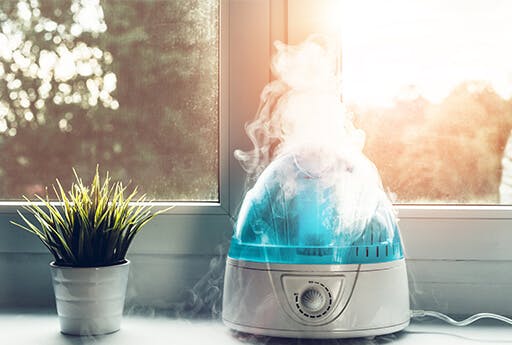
What is recurrent congestion?
Breathing consists of two phases: breathing in (inhalation) and breathing out (exhalation). Breathing involves the movement of air into and out of the chest, and is also called ventilation. The term respiration relates to the exchange of gases in the lungs that happens when you breathe.1
The respiratory system works so that you breathe in and out comfortably at rest where the least effort is required to move air – and you’re probably not conscious of your breathing. When you exercise, you need to move more air. To do this you can take bigger breaths or breathe more quickly – usually both.2
What happens when our nose is congested?
Most of us think we get a blocked nose as a result of a build-up of excess much mucus. Actually, it’s the swelling of the nasal lining that leads to nasal congestion. Viruses and bacteria, or allergens like dust and pollen, can all cause inflammation in the nasal passageways, which in turn produces swelling that reduces or even blocks the airflow through the nostrils.3
Having a blocked nose – with or without cold symptoms – can be a real drag on our energy, especially if it persists over time. It not only interferes with our daytime activities, leaving us feeling thick-headed and slightly breathless, it keeps us awake at night, as well.3
What causes persistent nasal congestion?
Causes of a long-term blocked nose include:
- Allergic rhinitis – This is an allergic reaction to air-borne particles produced by dust mites, pollen, pets or other allergens. If you notice that your blocked nose is worse in certain environments or during certain seasons, then it could be you are suffering from allergic rhinitis.2,4
- Non-allergic rhinitis: these would include:
- Smoking – Every time you smoke, you irritate your nasal lining, so if you smoke every day, your nose can feel constantly blocked. Similarly, sniffing drugs or other irritants may quickly produce a blocked or sniffy nose.2
- Air pollution – research has shown that chronic exposure to air pollution can irritate your airways, causing inflammation and compromising your nose’s natural function to filter air and remove the mucus.*5
Other causes of a long-term blocked nose include:2
- Nasal polyps – If you’ve had a blocked nose for several weeks it could be you have nasal polyps – small growths of tissue in your nasal passage that can block airflow. Polyps aren’t harmful, but it’s a good idea to have them examined by your doctor as there may be a case for removing them.
- Deviated septum – The nasal septum is the cartilage sitting between the two nostrils. Normally, it divides the nose almost equally in two, but with some people, the septum lies off to the side. This can make one nostril feel more blocked than the other.
- Obstruction, in some cases doctor advice is needed – Young children have a habit of pushing random objects up their nose. So, if your child has been complaining about a blocked nose for a while, you could check they haven’t lodged something up their nose!
How can I prevent persistent nasal congestion?
Here are some steps you can take to help prevent or reduce nasal congestion all year round:6
1. For cold and flu, maintain a good hygiene:
- wash your hands frequently
- avoid sharing drinking glasses or utensils
- avoid touching your eyes or nose as this can let the virus in


2. You can look to take the following steps at home to help manage persistent nasal congestion:2
- Nasal washes: these can keep the natural protective function of the mucous lining intact
- Keep your head elevated: when you are lying flat, it is more difficult for gravity to help drain mucus out of your nasal passages
- Identify allergens: if you know that certain situations trigger your symptoms, then take steps to reduce exposure to the allergen and see if your symptom improves
- Eat less dairy produce and wheat: even if you are not specifically allergic to these food groups, most people suffering a blocked nose, even if associated with temporary causes such as a cold or flu, will benefit from reducing these foods from their diet
3. Regular nasal irrigation can also help manage the symptoms of persistent nasal congestion by helping to wash away trapped air pollutants from your nose.7
References:
- Novotny S, Kravitz L. The Science of Breathing. Available from: https://www.unm.edu/~lkravitz/Article%20folder/Breathing.html (last accessed March 2020)
- A.Vogel. Constant blocked nose. Available at: https://www.avogel.co.uk/health/immune-system/blocked-nose/constant-blocked-nose/ (last accessed April 2020)
- Meltzer EO, et al. Treatment of congestion in upper respiratory diseases. Int J Gen Med. 2010; 3: 69–91.
- Dykewicz MS, Hamilos DL. Rhinitis and sinusitis. J Allergy Clin Immunol. 2010 Feb;125(2 Suppl 2):S103–15
- Shusterman D. The effects of air pollutants and irritants on the upper airway. Proc Am Thorac Soc. 2011;8(1):101–5
- NHS. Common cold. Available at: https://www.nhs.uk/conditions/common-cold/ (last accessed April 2020)
- Rabago D and Zgierska A. Saline nasal irrigation for upper respiratory conditions. Am Fam Physician. 2009;80(10):1117–9
- Papsin B, McTavish A. Saline nasal irrigation. Its role as an adjunct treatment. Can Fam Physician. 2003; 49:168–73
Show all references
Close references






